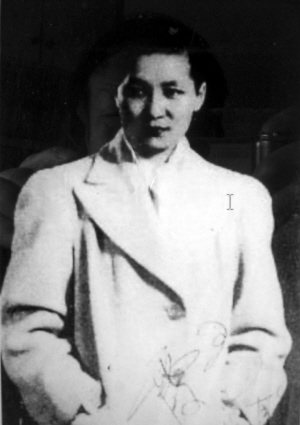Esther Eng facts for kids
Quick facts for kids
Esther Eng
|
|||||||||||
|---|---|---|---|---|---|---|---|---|---|---|---|
 |
|||||||||||
| Born | 24 September 1914 San Francisco, California, U.S.
|
||||||||||
| Died | January 25, 1970 (aged 55) New York City, U.S.
|
||||||||||
| Occupation | Film director, producer | ||||||||||
| Years active | 1936–1961 | ||||||||||
| Chinese name | |||||||||||
| Traditional Chinese | 伍錦霞 | ||||||||||
| Simplified Chinese | 伍锦霞 | ||||||||||
|
|||||||||||
Esther Eng (born September 24, 1914 – died January 25, 1970) was an amazing film director and producer. Her birth name was Ng Kam-ha. She was a Cantonese-American filmmaker and the first woman to direct Chinese-language movies in the United States.
Esther Eng made four feature films in America and five in Hong Kong. She is remembered as a trailblazer who broke barriers in film. She showed that women could be successful directors, no matter their background.
Contents
Early Life of Esther Eng
Esther Eng was born in San Francisco, California, on September 24, 1914. She was one of ten children in her family. Her grandparents had moved to America from a place called Toy Shan (now Taishan) in southern China.
Esther loved Cantonese Opera, which is a traditional Chinese art form. Living in San Francisco, she got to meet many Cantonese singers and actors. San Francisco had popular Chinese theaters that hosted famous performers from China.
Esther Eng's Film Career
When Esther Eng was 19, her father and his business friends started a film company. Esther became a producer for this new company. Her first movie credit was as a co-producer for the film Heartache (1936).
Heartache was filmed in Hollywood and took only eight days to make. Parts of the movie were even in color! In 1936, Esther traveled to Hong Kong with friends for the movie's premiere. There, it was shown as Iron Blood, Fragrant Soul.
Directing Films in Hong Kong
After China went to war with Japan, Esther directed a movie called National Heroine (1937). This film was about a brave female pilot fighting for her country. It was a big hit! Because of its success, Esther stayed in Hong Kong.
She directed two more films there: Ten Thousand Lovers and Storm of Envy, both released in 1938. She also helped direct A Night of Romance, A Lifetime of Regret. In 1939, she created It's A Women's World. This special film had an all-female cast, showing 36 women in different jobs.
Returning to America
In 1939, Esther came back to San Francisco. She started distributing Cantonese films in Central and South America. In 1941, she directed Golden Gate Girl in San Francisco. This movie got a good review from Variety magazine.
Esther went back to Hong Kong to plan a war film in 1946. But after months of work, she had to stop the project. By mid-1947, she was back in California. There, she made The Blue Jade, starring Cantonese Opera singer Fe Fe Lee. She then made another film with Lee called Too Late For Springtime (1949). This movie was about a Chinese girl and a Chinese-American soldier. Next, she filmed Mad Fire Mad Love in the Hawaiian Islands, a romance story about a mixed-race woman and a Chinese sailor.
Later Career and Business
In 1950, Esther Eng took a break from filmmaking. She started a restaurant business with her friend Bo Bo, an actor who was stuck in New York. Esther helped him with his acting career in the U.S. and later named one of her restaurants "Bo Bo". This was the first of her five restaurants in Manhattan. The Esther Eng Restaurant opened in 1959.
In 1961, she worked on her last film, Murder in New York Chinatown. She co-directed it and filmed all the outdoor scenes.
Esther Eng's Film Style
Esther Eng's movies were usually romantic dramas. They often focused on women's stories. Sadly, most of her films are now lost films, meaning they no longer exist. Only two are still known: Golden Gate Girls and Murder in New York Chinatown.
Esther Eng's Later Life and Legacy
Esther Eng passed away from cancer on January 25, 1970, in New York City. She was 55 years old.
Remembering Esther Eng
On April 1, 2013, a documentary film about Esther Eng's life was shown. It was called Golden Gate Silver Light and premiered at the Hong Kong International Film Festival. The director, Louisa Wei, was inspired to make the film after finding Esther's old photo albums from 1928 to 1948. While making the documentary, Wei found more albums, but no audio or film recordings of Esther herself.
Louisa Wei's 2014 documentary, Golden Gate Girls, also compared Esther Eng to another female director, Dorothy Arzner. A film expert named Judith Mayne said in the documentary that both Esther Eng and Dorothy Arzner were "real exceptions" who showed it was possible to have a successful film career outside of the usual paths.
Images for kids
 | Jackie Robinson |
 | Jack Johnson |
 | Althea Gibson |
 | Arthur Ashe |
 | Muhammad Ali |


